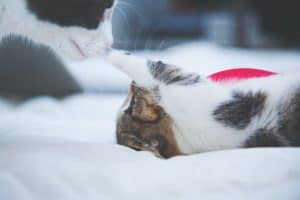Orange cats are known for their fiery personalities, but have you ever wondered why they seem to be angrier than other colored cats? In this blog post, we will explore the reasons behind why orange cats can sometimes display more aggressive behavior.
The Genetics Behind Orange Fur
Orange cats, with their vibrant coats, often have a fiery reputation when it comes to their temperament. But what many don’t realize is that their orange fur isn’t just a random color choice by Mother Nature. The genetics behind orange fur can actually influence a cat’s personality traits, including their tendency towards aggression.
Orange fur is the result of a specific gene called the “O” gene, which is responsible for producing the pigment that gives these cats their distinctive hue. Interestingly, this gene is located on the X chromosome. As a result, orange cats are typically male, as they only need one copy of the “O” gene to display the orange color. Females, on the other hand, need two copies of the “O” gene, making them less common.
Now, you may be wondering how orange fur ties into a cat’s temperament. Well, studies have shown that there may be a link between coat color and behavior. Research has suggested that orange cats may exhibit more aggressive tendencies compared to cats of other colors. While genetics certainly play a role, it’s essential to consider other factors as well.
Environmental Factors
While genetics can influence a cat’s temperament to some extent, environmental factors also play a crucial role in shaping their behavior. For orange cats, upbringing and socialization can greatly impact their predisposition towards aggression.
The environment in which a cat is raised can have a significant impact on their behavior. If an orange cat is exposed to stressful or chaotic surroundings, they may be more likely to exhibit aggressive behaviors. Conversely, cats raised in nurturing and stable environments are more likely to develop calm and friendly personalities.
Socialization is another key factor to consider. Orange cats that have positive interactions with humans and other animals from a young age are more likely to grow up to be well-adjusted and sociable. On the other hand, orange cats that lack proper socialization may be more prone to aggression and fearfulness.
In conclusion, while orange cats may have a reputation for being angry, it’s crucial to understand that their coat color is just one piece of the puzzle. By considering both the genetics behind their orange fur and the impact of environmental factors, cat owners can better understand and potentially address any aggressive behaviors in their furry companions.
Health Issues
When your orange cat is feeling angry, it might not just be a bad attitude. Underlying health issues could be the culprit. Cats can’t verbally tell us when they’re in pain, so their discomfort can manifest as aggression. To rule out any health concerns, it’s crucial to schedule regular check-ups with your vet. Monitoring your cat’s health consistently is key to ensuring their well-being and managing any potential anger issues effectively.
Playful vs. Aggressive Behavior
Ever wondered if your orange cat is just playing rough or genuinely being aggressive? It can be challenging to differentiate between the two, but understanding your cat’s body language and cues is essential. Playful behavior often includes soft paws, purring, and a relaxed body posture. On the other hand, true aggression is often accompanied by hissing, flattening of ears, and a tense body. Redirecting aggressive tendencies involves providing appropriate outlets for your cat’s energy, such as interactive toys or climbing structures. Remember, a well-stimulated cat is a happy cat.
Ways to Reduce Aggression
Orange cats are known for their fiery tempers, but there are ways to help calm them down and reduce their aggression. One effective method is to provide plenty of interactive playtime. Engaging your orange feline in fun activities like chasing a laser pointer or playing with feather toys can help release pent-up energy and aggression. Additionally, mental stimulation is key. Puzzles and treat-dispensing toys can keep your cat’s mind engaged and prevent boredom-induced aggression.
Another way to reduce aggression in orange cats is through proper care. Ensuring your cat has a comfortable and stress-free environment can make a big difference. Providing hiding spots, perches, and scratching posts allows your furry friend to feel safe and secure. Regular grooming and veterinary check-ups are also essential to address any underlying health issues that may be causing aggression.
Lastly, positive reinforcement is crucial. Rewarding good behavior with treats and praise can encourage your orange cat to exhibit more desirable actions. Remember, patience is key when trying to reduce aggression in your feline companion. With time and dedication, you can help your orange cat become a calmer and happier pet.
Additional Insight: Implementing a consistent routine for feeding, playtime, and rest can also help reduce stress and anxiety in orange cats, ultimately decreasing their aggression levels.
Fun Facts About Orange Cats
Did you know that orange cats are often referred to as “ginger cats” or “marmalade cats”? These vibrant felines are not only known for their striking coat color but also for their unique personalities. Despite their reputation for being aggressive, orange cats are actually quite affectionate and love to cuddle with their human companions.
Another fun fact about orange cats is that most of them are male. The gene responsible for orange fur is located on the X chromosome, making orange coat color more common in male cats. Interestingly, most orange cats are also known for their vocal nature, often engaging in conversations with their owners through meows and purrs.
In addition, orange cats have been associated with good luck and prosperity in various cultures. In Japan, they are believed to bring financial success to their owners, while in Egypt, they were considered sacred animals associated with the sun god Ra. So, if you have an orange cat at home, consider yourself lucky!
Remember, while orange cats may have a reputation for being angry, they are just like any other pet with their own unique quirks and traits. Embracing their fiery personalities and providing them with love and care can help foster a strong bond between you and your beloved feline friend.
The Myth of the Angry Orange Cat
Forget what you’ve heard about orange cats being angrier than others – it’s simply a myth! Just like humans, cats have unique personalities that aren’t determined by their fur color. While some orange cats may have a feisty streak, it’s not a trait exclusive to them. It’s essential not to stereotype these beautiful felines based on their color but to treat each cat as an individual with its own quirks and preferences.
Harnessing the Power of the Orange Cat
When it comes to building a strong bond with your orange cat, understanding their fiery personality is key. Embrace their energetic nature by providing plenty of toys and playtime to keep them stimulated and engaged. Additionally, offering them a cozy spot to relax and unwind can help prevent pent-up energy that may lead to frustration. By working with your orange cat’s lively demeanor rather than against it, you can cultivate a fulfilling and harmonious relationship that benefits both of you.
Tips for Bonding with Your Orange Cat:
- Playtime: Engage your orange cat in interactive play sessions to keep them active and entertained.
- Routine: Establish a consistent feeding and play schedule to provide structure and stability for your feline friend.
- Positive Reinforcement: Reward good behavior with treats or affection to encourage desired traits and actions.
- Patience: Building trust and rapport with your orange cat takes time, so be patient and understanding as you strengthen your bond.
- Grooming: Regular grooming sessions can help maintain your cat’s coat and strengthen your bond through tactile interaction.
Remember, every cat is unique, so take the time to understand your orange cat’s individual needs and personality to foster a strong and loving relationship. With patience, love, and respect, you can tap into the incredible potential of your fiery feline companion.
Alex, a passionate animal lover, has experience in training and understanding animal behavior. As a proud pet parent to two dogs and three cats, he founded AnimalReport.net to share insights from animal experts and expand his knowledge of the animal kingdom.




